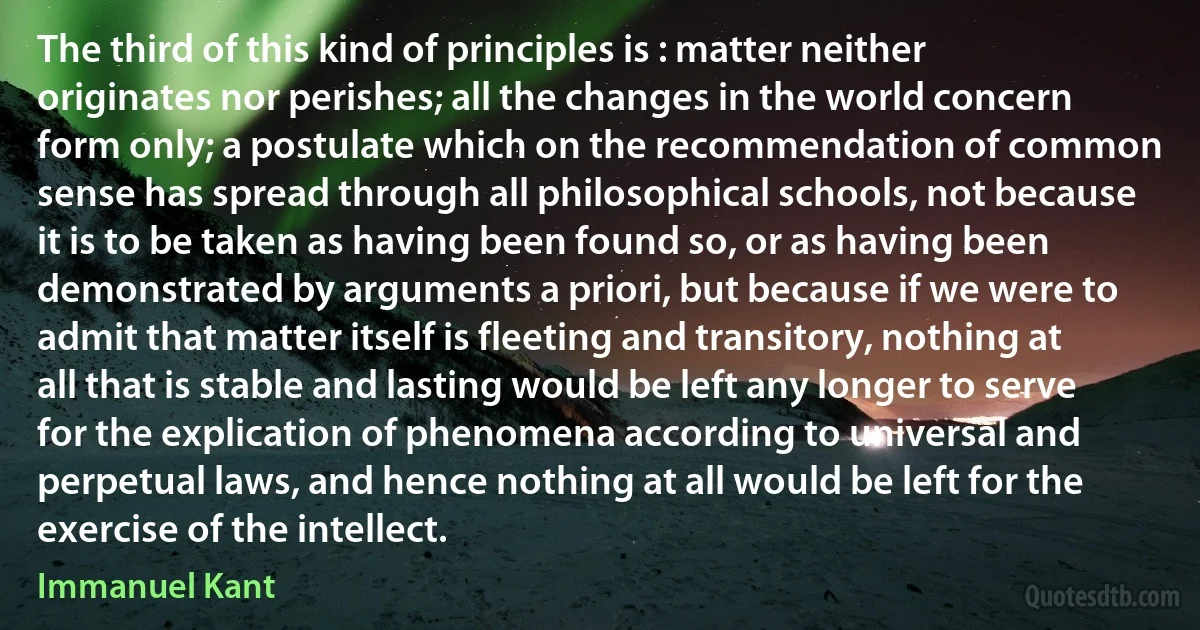Intellect Quotes - page 19
The sensuous may be exceedingly distinct, while intellectual concepts are extremely confused. The former we observe in the prototype of sensuous knowledge geometry; the latter, in the organon of all intellectual concepts, metaphysics. It is evident how much toil the latter is expending to dispel the fogs of confusion darkening the common intellect, though not always with the happy success of the former science.

Immanuel Kant
The spurious axioms of the third kind from conditions proper to the subject whence they are transferred rashly to the object are plentiful, not, as in those of the Second Class, because the only way to the intellectual concept lies through the sensuous data, but because only by aid of the latter can the concept be applied to that which is given by experience, that is, can we know whether something is contained under a certain intellectual concept or not. To this class belongs the threadbare one of the schools: whatever exists contingently does at some time not exist. This spurious principle springs from the poverty of the intellect, having insight frequently into the nominal, rarely into the real, marks of contingency or necessity.

Immanuel Kant
The prejudices of the second species, since they impose upon the intellect by the sensual conditions restricting the mind if it wishes in certain cases to attain to what is intellectual, lurk more deeply. One of them is that which affects knowledge of quantity, the other that affecting knowledge of qualities generally. The former is: every actual multiplicity can be given numerically, and hence, every infinite quantity; the latter, whatever is impossible contradicts itself. In either of them the concept of time, it is true, does not enter into the very notion of the predicate, nor is it attributed as a qualification to the subject. But yet it serves as a means for forming an idea of the predicate, and thus, being a condition, affects the intellectual concept of the subject to the extent that the latter is only attained by its aid.

Immanuel Kant
The use of the intellect in the sciences whose primitive concepts as well as axioms are given by sensuous intuition is only logical, that is, by it we only subordinate cognitions to one another according to their relative universality conformably to the principle of contradiction, phenomena to more general phenomena, and consequences of pure intuition to intuitive axioms. But in pure philosophy, such as metaphysics, in which the use of the intellect in respect to principles is real, that is to say, where the primary concept of things and relations and the very axioms are given originally by the pure intellect itself, and not being intuitions do not enjoy immunity from error, the method precedes the whole science, and whatever is attempted before its precepts are thoroughly discussed and firmly established is looked upon as rashly conceived and to be rejected among vain instances of mental playfulness.

Immanuel Kant
Many people think that the progress of the human race is based on experiences of an empirical, critical nature, but I say that true knowledge is to be had only through a philosophy of deduction. For it is intuition that improves the world, not just following a trodden path of thought. Intuition makes us look at unrelated facts and then think about them until they can all be brought under one law. To look for related facts means holding onto what one has instead of searching for new facts. Intuition is the father of new knowledge, while empiricism is nothing but an accumulation of old knowledge. Intuition, not intellect, is the 'open sesame' of yourself.

Albert Einstein
Our time is Gothic in its spirit. Unlike the Renaissance, it is not dominated by a few outstanding personalities. The twentieth century has established the democracy of the intellect. In the republic of art and science, there are many men who take an equally important part in the intellectual movements of our age. It is the epoch rather than the individual that is important. There is no one dominant personality like Galileo or Newton. Even in the nineteenth century, there were still a few giants who outtopped all others. Today the general level is much higher than ever before in the history of the world, but there are few men whose stature immediately sets them apart from all others.

Albert Einstein
As the saints and prophets were often forced to practise long vigils and fastings and prayers before their ecstasies would fall upon them and their visions would appear, so Virtue in its purest and most exalted form can only be acquired by means of severe and long continued culture of the mind. Persons with feeble and untrained intellects may live according to their conscience; but the conscience itself will be defective. ... To cultivate the intellect is therefore a religious duty; and when this truth is fairly recognized by men, the religion which teaches that the intellect should be distrusted and that it should be subservient to faith, will inevitably fall.

William Winwood Reade
If all things in this universe exist, it is because they participate in the Being of God, if there are some things with life, it is because they are reflections of the life of God; if there are beings endowed with intellect and will - like men and angels - it's because they are a participation of the Sovereign Intellect which is God.

Fulton J. Sheen
Nicholas Humphrey, a Cambridge psychologist, was the first to see clearly the solution to this puzzle. We use our intellects not to solve practical problems, but to outwit each other. Deceiving people, detecting deceit, understanding people's motives, manipulating people -these are what the intellect is used for. So what matters is not how clever and crafty you are, but how much cleverer and craftier than other people. The value of intellect is infinite. Selection within the species is always going to be more important than selection between the species.

Matt Ridley
The inquiry of the intellect never ceases until it finds that cause of which nothing is the cause but which is itself the cause of causes. This cause is none other than the boundless God. Similarly, the desire of the will is not satisfied by any good, as long as we believe that there is yet another beyond it. Therefore, the will is satisfied only by that one good beyond which there is no further good. What can this good be except the boundless God?

Marsilio Ficino
If someone asks us which of these is more perfect, intellect or sense, the intelligible or the sensible, we shall promise to answer promptly, if he will first give us an answer to the following question. You know, my inquiring friend, that there is some power in you which has a notion of each of these things-a notion, I say, of intellect itself and of sense, of the intelligible and the sensible. This is evident, for the same power which compares these to each other must at that time in a certain manner see both. Tell me, then, whether a power of this kind belongs to intellect or sense? ... Sense, as you yourself have shown, can perceive neither itself nor intellect and the objects of intellect; whereas intellect knows both. ... Therefore, intellect is not only more perfect than sense but is also, after perfection itself, in the highest degree perfect.

Marsilio Ficino



